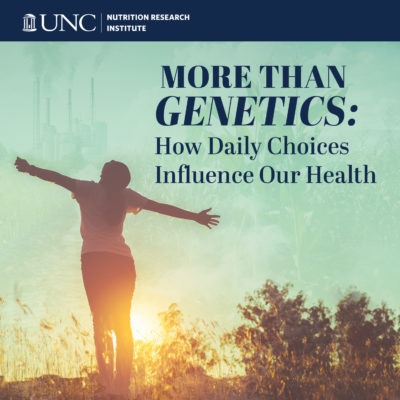As the field of translational exposomics gains momentum, the UNC Nutrition Research Institute (NRI) stands at the forefront of research exploring how nutrition interacts with our environment and genes to influence lifelong health.
A recent publication in Human Genomics, co-authored by NRI faculty Susan Sumner, PhD, highlights the growing recognition that what we eat – and how our bodies respond to it – is shaped not just by our DNA, but by a lifetime of exposures. This integrative approach seeks to move beyond the traditional focus on genetics alone, recognizing that our environment and daily choices play a significant role in determining disease risks and overall well-being. This emerging area of science holds promise for advancing precision nutrition strategies that are tailored to individual needs and lifestyles.
Central to this discussion is the concept of the “exposome,” defined as the totality of environmental exposures an individual encounters throughout their life, from conception onward. This encompasses not only external factors like diet, pollutants, and lifestyle habits but also internal processes such as metabolism and inflammation. The exposome framework acknowledges that these exposures can have cumulative and even multigenerational effects, influencing health outcomes in complex ways.
Nutrition emerges as a pivotal component of the exposome. Dietary choices can modulate gene expression and metabolic pathways, thereby affecting disease susceptibility. For instance, certain nutrients or other dietary components may interact with genetic variants to either mitigate or exacerbate the risk of developing conditions like cardiovascular disease or diabetes. Understanding these interactions is crucial for developing personalized dietary recommendations that align with an individual’s genetic profile.
The study highlights the importance of integrating exposomic data with genomic information to enhance precision medicine. By employing advanced technologies such as multi-omics analyses and exposome-wide association studies (EWAS), researchers can identify biomarkers that reflect the interplay between diet, environment, and genetics. These insights can inform targeted interventions aimed at disease prevention and health promotion.
“Nutrition is one of the most modifiable and impactful components of the exposome,” said Susan Sumner, PhD, Professor of Nutrition at the UNC Nutrition Research Institute and co-author of the study. “By examining how diet and nutrients interact with our genes and environment, we can begin to tailor personalized interventions that are precise, and effective for mitigating the adverse effects of chemical exposures and preventing disease.”
Moreover, the research underscores the need to consider socio-economic and demographic factors in exposomic studies. Access to nutritious food, exposure to environmental toxins, and lifestyle behaviors often vary across different populations, contributing to differences in health outcomes. Incorporating these variables into exposomic analyses can lead to more precise health strategies and policies.
This publication advocates for a comprehensive approach to health that integrates environmental exposures with genetic data. Such an approach holds promise for advancing personalized medicine, enabling more accurate risk assessments, and developing tailored interventions that consider the full spectrum of factors influencing health. This work aligns with broader national efforts and federal administration priorities to integrate environmental and genomic data to inform personalized health strategies. As research in translational exposomics progresses, it may pave the way for more effective and individualized strategies in disease prevention and health optimization.
Sarigiannis, D., Karakitsios, S., Anesti, O., Stem, A., Valvi, D., Sumner, S. C. J., Chatzi, L., Snyder, M. P., Thompson, D. C., & Vasiliou, V. (2025). Advancing translational exposomics: Bridging genome, exposome and personalized medicine. Human Genomics, 19(1), Article 48. https://doi.org/10.1186/s40246-025-00761-6
Susan Sumner, PhD is a Professor of Nutrition at UNC Chapel Hill’s Nutrition Research Institute (NRI), and the Director of the Metabolomics and Exposome Laboratory (MEL) at UNC Chapel Hill. Dr. Sumner is working to make personalized medicine and precision nutrition a reality. Using state-of-the-art metabolomics and exposome technologies, the lab determines how molecules that are present in our tissues and biological fluids are associated with states of health and wellness. [read more]

